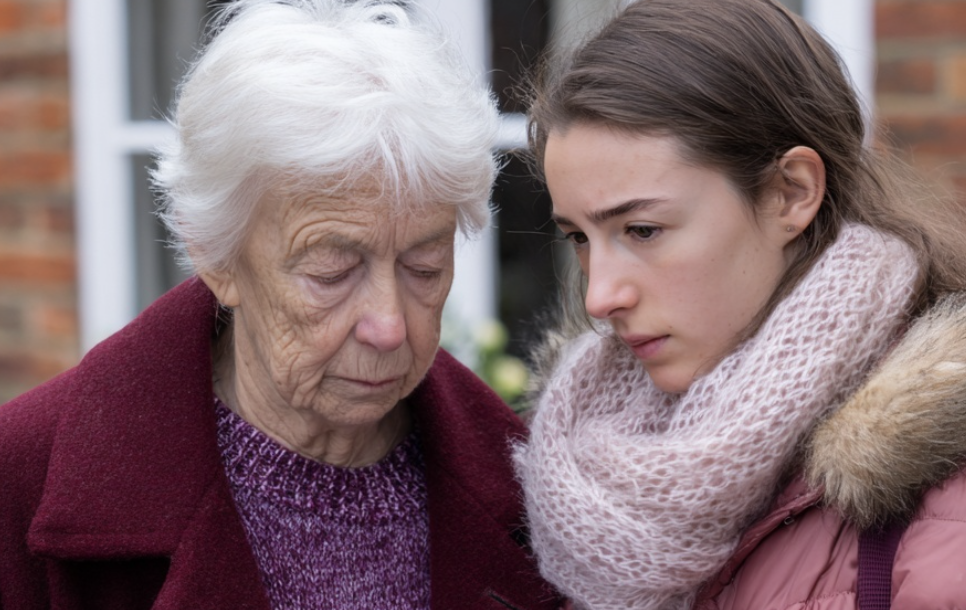My name is Tamara Alexeyevna. I’m seventy-four. Once, my life was full—filled with love, work I adored, a warm home, and three beautiful children. But everything changed ten years ago when my husband passed away. His heart simply gave out. After he was gone, the house felt cold and hollow, and slowly, I began to feel invisible.
The one who drifted away the most was my youngest daughter, Irina. From a young age, she was driven and ambitious, dreaming of success and a high-flying career. When she got into university in the capital, I was overjoyed. I gave her everything I could—my savings, my mother’s jewelry, even sold my father’s old Volga just to help her start her new life.
Years flew by. Irina got married and had a son. Our conversations became rare, our visits even rarer. She was always in a hurry, always distracted. Then, one day, she just stopped calling.
Three months passed in silence before she showed up, unannounced.
“Mum,” she said, not meeting my eyes, “living alone is hard for you. It’s time we think about a care home. You’ll be looked after there, surrounded by people, with doctors nearby…”
I didn’t say a word. My chest ached with silent grief, but I didn’t argue. I just nodded.
The next day, she took me to a private retirement home on the city’s outskirts. It was beautiful, modern, with a lush garden and cozy rooms. Irina signed the paperwork quickly, gave me a short goodbye, and left—as if she had finally unburdened herself.
I sat on a bench outside, watching lilac petals fall, when a flood of memories returned. This building… my husband and I had built it. We raised funds, dreamed of a dignified old age. It was our project, our dream. He had registered the property in my name, telling me, “Just in case the children ever forget who you are.”
Wandering through the grounds, I stepped into the administrative office. The director, a young man in glasses, smiled and said kindly, “Tamara Alexeyevna? What brings you here? You own this place!”
I nodded, my voice shaky. He seemed to understand at once.
“Would you like me to revoke your daughter’s visitation rights?”
I gave a bitter smile.
“No… I have another plan.”
I didn’t leave—but I didn’t stay as a resident either. I stayed as the owner.
That very evening, I gathered the staff, told them the truth, and announced that I would now personally oversee the care, comfort, and dignity of everyone living there. For the first time in many years, I felt needed again.
A few weeks later, someone came to visit me—my grandson. Alone.
“Grandma, I missed you,” he said quietly. “Mum’s upset because you won’t invite us over anymore.”
I hugged him tightly. I didn’t want revenge. I had already made my choice—to live with purpose, to help, to grow stronger.
When Irina eventually came, she was stopped at the gate. The administrator told her she no longer had access. She called. She wrote. She came back with her husband. I stayed silent.
Then, one day, I received a letter.
“Mum… I don’t know if you’ll ever be able to forgive me. I convinced myself I was doing it for your sake—but it was just easier for me. Easier to hand over responsibility, to quiet the guilt and ignore the loneliness I knew you felt.
I thought you were weak. That you’d accept anything.
But now I see—you’re stronger than all of us.
Every month, I come to the gates. I watch you smiling, laughing with others. It hurts, but I’m also proud—and jealous. You give them the warmth I never gave you.
If you can… someday…
Let me hug you—not as your daughter, but as someone who finally understands.”
I held that letter for a long time. Read it again and again. And finally, tears came—tears I hadn’t cried in a year.
That evening, I sat by the window as leaves fluttered to the ground, just like the lilac petals that first day. Life had come full circle. But I didn’t yet know if I was ready to open my heart again.
A week later, a new resident arrived. Frail, quiet, with eyes dulled by sorrow. She sat next to me on a bench and said gently:
“I’ve heard you’re not just the head here—but a kind soul. Can I talk to you?”
We spent the evening together. She spoke about her daughter, how she was abandoned after falling ill, how everything crumbled around her. I didn’t interrupt. I didn’t offer pity. I simply listened—just as I had once longed for someone to do for me.
And that night, I understood:
Forgiveness isn’t weakness.
It’s strength—earned through pain.
When spring came, I wrote a short letter to Irina:
“Come.
No explanations.
Just hug me.
I’ll be waiting.”
She arrived—thinner, older, her first gray hairs showing. She stood at the doorway like a child, lost and nervous.
I walked up to her. We stood in silence. Then she stepped forward and wrapped her arms around me.
“I’m sorry, Mum… I thought I was grown up. But now I know—home isn’t a job. It’s not a man. It’s you. You are my home.”
I didn’t speak. I simply stroked her back. Some things don’t need words—only warmth.
Since that day, Irina visits every week. Not as a guest, but as my daughter. She helps around the grounds, bakes pies for the residents, brings books. And in her eyes, I see again the little girl whose hair I used to braid.
Three months later, she came with my grandson and said:
“Mum, we want you to come back home. We’ve changed. We want to be a real family—if you’re willing.”
I smiled softly.
“Ira, I don’t want to go back. I’ve found myself here. But I want to be close—not as someone to be looked after, but as your equal.”
And we hugged.
No bitterness.
No pain.
Just love.
